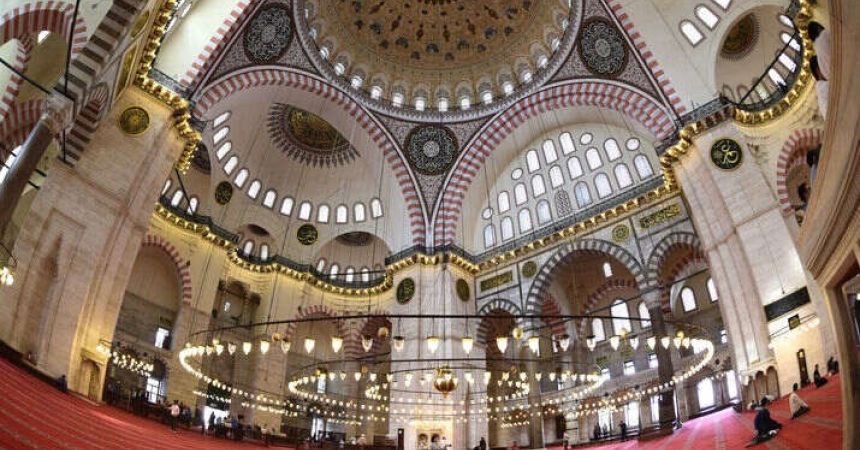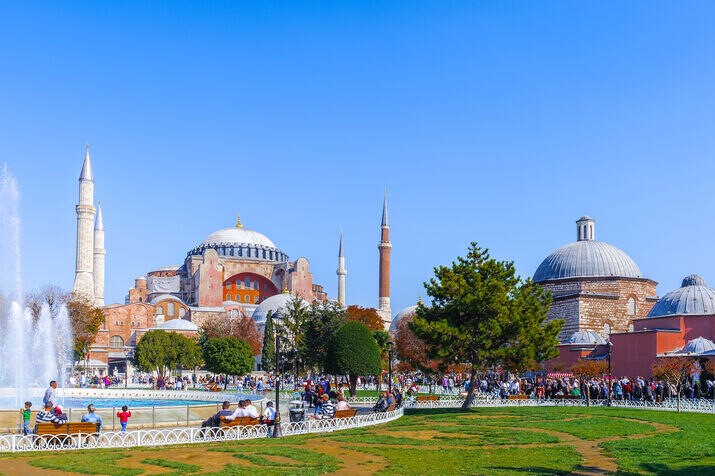
Ramadan in Turkey | Travel Tips & Cultural Insights
Ramadan, the holiest month in Islam, is a time of fasting, prayer, and reflection. For Muslims, it is a month of spiritual renewal, charity, and community. While the month brings about a unique atmosphere of devotion and reverence, it also significantly impacts daily life across many countries, including Turkey. If you’re planning to visit Turkey during Ramadan, it’s important to understand how the month affects local culture, customs, and activities so that you can experience it respectfully and enjoy your trip to the fullest.
In this blog, we’ll explore what you can expect when visiting Turkey during Ramadan, tips for navigating changes in daily routines, and how to make the most of your time in the country while being considerate of local traditions. From meal timings and cultural experiences to local festivities, we’ll guide you through everything you need to know about traveling Turkey during winter.
Understanding Ramadan in Turkey
Ramadan in Turkey, as in other Muslim-majority countries, is a deeply spiritual time. It is the ninth month of the Islamic lunar calendar, during which Muslims fast from dawn until sunset. This means refraining from eating, drinking, smoking, and engaging in other physical needs. The fast is broken at sunset with a meal known as Iftar, and the pre-dawn meal before the fast begins again is called Suhoor.
However, Ramadan in Turkey is not just about fasting; it is a time for reflection, increased devotion, and community activities. It’s also a time of generosity and charity, with many Turks donating to the less fortunate during the month.
Ramadan’s Impact on Daily Life in Turkey
While tourists are free to eat and drink as they wish, daily life in Turkey changes during Ramadan. Many businesses, restaurants, and public spaces adjust their hours, and certain cultural norms around food, drinking, and entertainment are observed. Understanding these changes will help you respect local customs and make the most of your experience.
What to Expect During Ramadan in Turkey
Visiting Turkey during Ramadan offers a unique cultural experience. While some aspects of the country’s daily rhythm slow down, others come to life, creating an atmosphere full of warmth, community, and celebration. Here’s what you can expect:
Altered Business Hours
One of the most noticeable effects of Ramadan in Turkey is the change in business hours. Many businesses adjust their schedules to accommodate fasting, with shorter working hours during the day and extended hours at night.
- Shops and Restaurants: In larger cities like Istanbul, Ankara, and Izmir, many restaurants, cafes, and shops may be closed or have reduced hours during the day, particularly before sunset. However, restaurants and eateries in tourist areas or those catering to non-Muslim customers may remain open.
- Government Offices: Many government offices, post offices, and banks may also operate on shorter hours during Ramadan. If you need to complete any paperwork or banking, try to do so earlier in the day before working hours are reduced.
- Nighttime Bustle: After sunset, the atmosphere in Turkey comes alive. This is when restaurants, cafes, and bazaars fill up as people gather for Iftar. You may notice extended hours for shopping, dining, and entertainment in the evenings.
Iftar and Suhoor: The Heart of Ramadan Meals
The two main meals during Ramadan are Iftar (the meal to break the fast) and Suhoor (the pre-dawn meal before the fast begins). In Turkey, these meals are not just about eating—they are an opportunity to gather with family, friends, and community.
- Iftar: Iftar is a social event, often beginning with a prayer and the breaking of the fast with dates, olives, and a glass of water. It’s followed by a large, hearty meal that can include soup, meat dishes, rice, salads, desserts, and traditional Turkish drinks like ayran (yogurt drink). Many restaurants offer special Iftar buffets, and it’s common for families and friends to dine together, especially at local mosques, parks, and public squares.
- Suhoor: Suhoor is the pre-dawn meal consumed before the fasting period begins again. In Turkey, it’s often lighter than Iftar but still quite filling. It can include a variety of dishes such as bread, cheese, olives, eggs, and simit (Turkish sesame bread). Suhoor is an important meal, as it helps sustain individuals throughout the day of fasting.
Local Ramadan Festivities
Ramadan in Turkey is marked by vibrant cultural celebrations, street fairs, and community gatherings. Some cities, especially Istanbul, host special events to mark the month. Here’s what you can expect:
- Ramadan Festivals: Across Turkey, Ramadan festivals are held, with activities like music performances, cultural shows, traditional Turkish dances, and local crafts. Istanbul’s Suleymaniye Mosque and Sultanahmet Square often host special Ramadan events, including performances and free public Iftar meals.
- Ramadan Drummers: In Turkish villages and cities, traditional drummers, known as dede, walk through neighborhoods in the early morning before Suhoor to wake people up for their pre-dawn meal. The sound of the drum is a unique and charming part of Ramadan in Turkey.
- Street Markets: During Ramadan, the streets and bazaars in cities like Istanbul and Ankara often become more lively. Vendors sell traditional Ramadan sweets, lanterns, and food items. Baklava, kadayif (shredded pastry with syrup), and güllaç (a dessert made with milk and rosewater) are common treats during Ramadan.
Evening Prayers and Taraweeh
Taraweeh prayers are special evening prayers held during Ramadan, and they’re a significant part of religious life in Turkey during this time. Mosques fill up with worshippers after Iftar, and people gather for the prayers, which can last for several hours. While you don’t need to participate, you may want to visit a mosque to witness the beauty of these nightly prayers, especially in iconic mosques like Sultanahmet (Blue Mosque) in Istanbul.

Increased Charity and Giving
Ramadan is also a time of giving, and many Turks take this opportunity to donate to those in need. Charitable organizations distribute food, clothing, and supplies to the less fortunate during the month. As a visitor, you might notice iftar tents set up in public places where free meals are distributed to the homeless and the poor. Many people also give to local charities, including hospitals, orphanages, and schools. If you’re interested, you may consider donating to a local cause during your stay.
What to Do (And Not Do) When Visiting Turkey During Ramadan
While visitors to Turkey are not required to fast, it’s important to be respectful of local customs and traditions. Here are some helpful dos and don’ts to ensure you enjoy your time in Turkey while respecting Ramadan:
Don’t Eat or Drink in Public During Daytime Hours
Although you are free to eat and drink in private spaces, it’s considered disrespectful to eat, drink, or smoke in public during the daylight hours of Ramadan. This includes drinking water, eating snacks, or smoking in public parks, streets, or public transport. Instead, enjoy your meals indoors or in tourist-friendly spots where eating during the day is allowed.
Dress Modestly
Respect for cultural norms is especially important during Ramadan. While Turkey is generally more liberal compared to some other Muslim-majority countries, dressing modestly is appreciated, particularly when visiting mosques or religious sites. Avoid wearing shorts or sleeveless tops, and opt for outfits that cover your shoulders and knees. In mosques, women may be asked to cover their hair, and you should wear a headscarf if visiting such places.
Embrace the Spirit of Ramadan in Turkey
Ramadan is about more than just fasting—it’s a time for reflection, self-discipline, and charity. While you’re visiting, take the opportunity to learn more about the spiritual significance of Ramadan in Turkish culture. Many museums and cultural centers offer free events and talks about Islamic history and Ramadan traditions, which can deepen your understanding of the month’s importance.
Enjoy the Special Ramadan Foods
One of the highlights of Ramadan in Turkey is the food, and it’s something that you definitely don’t want to miss. During Ramadan, Turkish restaurants and cafes often offer special Iftar menus, which include traditional dishes like kebabs, pide (Turkish flatbread), lentil soup, börek (stuffed pastry), and various sweet treats like baklava and lokum (Turkish delight). If you’re invited to an Iftar meal, don’t hesitate to enjoy the warm hospitality and experience a cultural tradition that brings people together.
Be Mindful of Quiet Hours
During Ramadan, many people choose to wake up early for Suhoor and go to bed later due to Taraweeh prayers. If you’re staying in a hotel or guesthouse, be mindful of quiet hours in the evening and early morning. Keep noise levels down during those times out of respect for those who may be observing the fast and praying.
Visiting Turkey Tourist Sites During Ramadan
Many of Turkey’s top tourist sites, including the ancient ruins of Ephesus, the Roman theater in Aspendos, and the famous mosques of Istanbul, remain open during Ramadan. However, you may notice a few differences in opening hours, and it’s important to plan accordingly:
Adjusted Opening Hours
Some tourist attractions may close earlier during the day, especially in the afternoon, to accommodate religious observances. In popular tourist areas like Istanbul, shops and attractions may open later or close earlier. It’s always a good idea to check the opening times in advance and plan your sightseeing accordingly.
Avoiding Crowds
Although Ramadan is a busy time for local families to spend time together, you’ll find that some tourist spots may be quieter during the day, especially in the afternoon. This can be an excellent opportunity to explore the sights without the usual crowds. In the evenings, however, expect more visitors as many locals head out to dine and attend events after Iftar.
Visiting Mosques in Turkey
Visiting mosques during Ramadan is a unique experience. Many mosques are beautifully decorated, and you may have the opportunity to observe the evening prayers. However, be aware that during the Taraweeh prayers, mosques can get crowded. It’s also advisable to dress conservatively and cover your shoulders and knees when entering mosques.
Embrace the Unique Experience of Ramadan in Turkey
Visiting Turkey during Ramadan offers a chance to experience a different side of this remarkable country. The month of Ramadan brings with it a sense of community, spirituality, and cultural pride that permeates every part of Turkish life. Whether you’re enjoying an Iftar meal, exploring Istanbul’s majestic mosques, or wandering through the quiet streets of historic towns, Ramadan in Turkey presents a unique and enriching opportunity to witness Turkish culture at its most vibrant.



